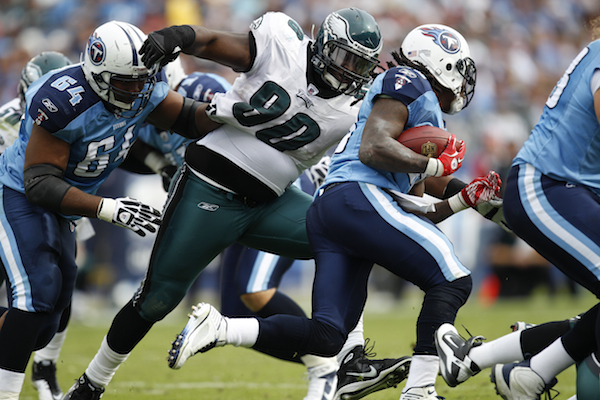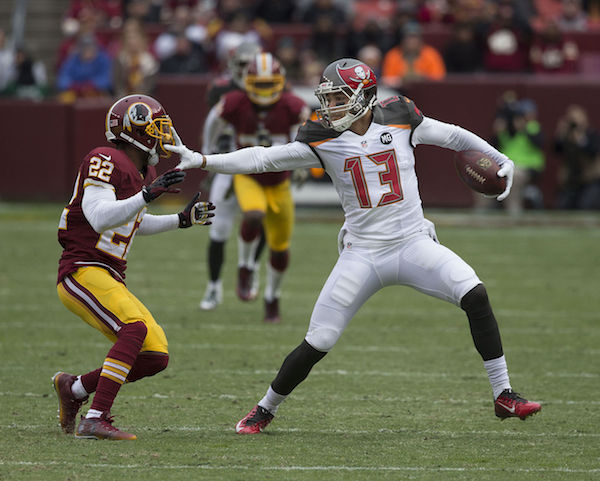Dear Sports Fan,
Yesterday you wrote a post explaining how daily fantasy sports work. Thanks! My question is, should I play daily fantasy sports (DFS)? I love fantasy football, so it seems tempting.
Thanks,
Fred (who isn’t me just lobbing a question back at myself. No, really)
Dear Fred,
No. You should not play daily fantasy sports (DFS).
Daily fantasy sports are a hot topic these days. If you watched football at all during the first weekend of the NFL season, you were inundated by ads for the two major daily fantasy sports companies, DraftKings and FanDuel. The two spent more than $27 million combined on television advertising during that period! In the days following that media blitz, there’s been a quick backlash against the industry. This wave was led by Joshua Brustein and Ira Boudway of Bloomberg Business, whose article, You Aren’t Good Enough to Win Money Playing Daily Fantasy Football described a landscape full of predatory professional gamblers armed with advanced statistics and personally designed spreadsheets. Their well researched and convincing argument was picked up by a horde of other newspapers and blogs, all quick to jump on the bandwagon and point out to their readers that they shouldn’t play daily fantasy sports because they won’t win. It was an important article, because it pierced through the advertising campaigns that suggest easy money is just around the corner. But, with apologies to Brustein and Boudway and the many people who agree with them, they are missing the point when it comes to deciding whether or not you should play. Gambling can be fun, as long as you don’t risk more than you can afford to lose. Long odds are not a sufficient argument against daily fantasy sports. The reason why you shouldn’t play daily fantasy sports isn’t because you’re almost certain to lose money, it’s because it’s not fun.
Daily fantasy football takes virtually every element of traditional fantasy football that’s fun and strips it from the game.
- In traditional fantasy football, you play against your friends. Last weekend I beat my friend Brian in our fantasy league. This weekend, I face a tough game against my friend and old boss, Jack. In my only foray into daily fantasy sports, I came in 158,247 place out of 331,428 entries in a contest for $100,000. Who won? I have no idea, but it certainly didn’t contribute to any friendships. Traditional fantasy football leagues provide a way for distant friends to stay connected and close friends to get even closer.
- Traditional fantasy football creates lasting ties to players. One of the arguments against getting involved in traditional fantasy football is that it changes a fan’s focus from their favorite team to the set of players who are on their team. Daily fantasy goes even farther in divorcing your rooting interest from the sport itself. In daily fantasy sports, you pick players for your team and discard them the next day. There’s no time to build lasting affection, like I have for some players who I’ve had for full seasons or more on my traditional fantasy team. For example, I might not know that Brandon Marshall is a mental health advocate if I hadn’t been following him carefully because he was on my fantasy team. Daily fantasy sports wouldn’t inspire me to celebrate when one of the young players who I’ve stashed on my bench for weeks gets an opportunity in the starting lineup or feel sad when an elder statesman loses his job.
- Traditional fantasy sports encourages interaction between people and teaches basic negotiating skills. In a traditional fantasy league, if you want to improve your team during a season, you need to trade with another owner in your league. You need to look at her team and think about what she needs compared to what you need. Most trades happen when one person identifies something the other person needs and offers it to them for something they have a surplus of. It’s not about tricking the other person, it’s about analysis and negotiation. Daily fantasy sports are between you and your computer and that’s it.
So yes, you shouldn’t play fantasy sports because it’s a money pit, but so is taking up ice hockey, owning a boat, or having kids. At least those three things are fun!
Thanks for reading,
Ezra Fischer


